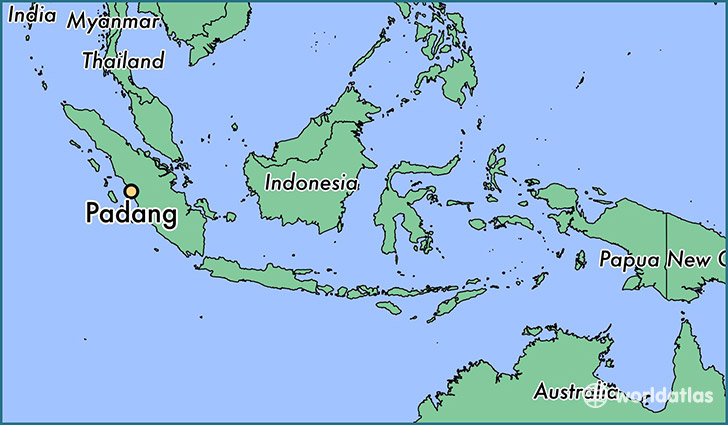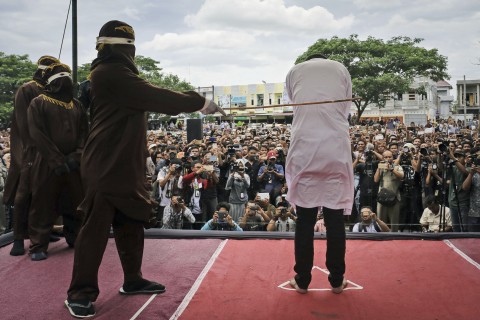Another Indonesian city outlaws gay sex
Colin Stewart is a 45-year journalism veteran living in Southern…
Indonesia has continued to cement its reputation as a hostile place to LGBTI+ people as the city of Pariaman on Sumatra island voted to outlaw gay sex.

By Lloyd Copper
The city council in Pariaman on Nov. 27 approved the new bylaw providing fines of 1 million rupiah (U.S. $70) for behaviors that “are considered LGBT,” the Jakarta Post reported in an Agence France-Presse article.
The bylaw prohibits “immoral acts” between same-sex couples and “acting as a transvestite”, but otherwise cites few concrete examples of banned behavior, AFP said.
Indonesian lawmakers have become increasingly worrying for those in the LGBTI+ community, with some bowing to pressure from Islamic hardliners.
In March, The Jakarta Post reported that trans people in the nation’s capital have been publicly humiliated and sent to rehabilitation centres.

In the overwhelmingly Muslim-majority area of Aceh province, two gay men were caned in front of a jeering crowd in July.
The new gay sex ban in Pariaman, a city of up to 100,000 people, is especially concerning because it demonstrates how homophobic laws and Islamic fundamentalism are spreading beyond Aceh.
“The local parliament in Pariaman based this particular bylaw on Islamic Sharia law”, said researcher Andreas Harsono, an expert on Indonesia working for Human Rights Watch. “They referred to the Qur’an to justify writing this law.”
But the new repression in Pariaman is far from the first such homophobic regulation outside Aceh province. Last year’s edition of ILGA’s State-Sponsored Homophobia listed several Indonesia areas and municipalities that penalise same-sex sexual relations through local ordinances:
- Provincial Ordinance on the Eradication of Immoral Behavior (No. 13/2002) in South Sumatra: classifies and penalises same
sex relations as “immoral behavior”. - Local Regulation [City Ordinance] Batam City No. 6/2002 about Social Ordinance, Social Order Article 9: forbids the setting up
of LGBT associations (explicitly mentioned). - Local Regulation [City Ordinance] Palembang City No. 2/2014 about the Abomination of Prostitution, Chapter V. Prohibition
Provisions, Article 8: outlaws “homosexual” “prostitution”. [The publication adds, “In the city of Palembang in South Sumatra one can receive jail time and hefty fines for same-sex relations.”] - Local Regulation [City Ordinance] about Prevention, Eradiction and Action toward Social Ills (No. 9/2010) in Padang
Panjang, West Sumatra: its definition includes same-sex relationships within its scope (paid, or not paid for). - District Ordinance on Social Order (No. 10/2007) in Banjar, South Kalimantan Province: mentions “abnormal” homosexual and
heterosexual acts (in addition to “normal” ones) in its definition of “prostitute”. No explanation is given for “normal” or “abnormal”
acts. It also prohibits the formation of organisations “…leading to immoral acts”, that are “…unacceptable to the culture of [local] society”. These are later explained by giving examples of lesbian and gay organisations “and the like”. - City Ordinance on the Development of a Value System in Social Life Based on the Teachings of Islam and Local Social Norms
(No. 12/2009) in Tasikmalaya, West Java: prohibits adultery and prostitution, both heterosexual and homosexual.
Those are in addition to:
- Aceh Regulation No. 6/2014 [Provincial Ordinance] on criminal offenses under Syariah law, passed in 2014, came into effect on
23 October 2015. The law stipulates a punishment of 100 lashes and/or up to approximately eight years in prison. The regulation
applies to local residents and to foreigners in the province for the crime of Liwat (male penetration) and Musahaqah (female samesex
sexual activity) in article 63 and 64.
Lloyd Copper comments:
Other than frightening a segment of the country’s population, like many homophobic laws, Indonesia’s homophobia as impacted HIV rates. Gay and bisexual men who have suffered a “five-fold” increase according to Human Rights Watch. The climate of homophobia, fuelled by religious extremists and uneducated people have no doubt discouraged people from learning about and engaging in safe-sex practices.
Sharia law and protection of LGBTI+ people do not mix. If Indonesia is to retain its official motto of “Bhinneka Tunggal Ika” — “Unity in Diversity” — then it will have to address keeping religion out of people’s bedrooms and not bowing to religious pressure.
Lloyd Copper, the author of this article, is an Australia-based LGBT rights activist.
Related articles:
- Indonesian city plans to fine residents for ‘LGBT behavior’ (November 2018, Reuters)
- Indonesian city to fine LGBT for being ‘public nuisance’ (November 2018, Jakarta Post)
- An Indonesian city has banned gay sex to ‘eradicate LGBT’ (November 2018, Pink News)
- Indonesia plunges deeper into anti-gay panic (
- Indonesia puts anti-gay bill on hold (, 76crimes.com)
- Indonesia [would] criminalise homosexual and extramarital sex under proposed law changes (March 2018, South China Morning Post)
- ‘Now Indonesia Wants to Hide Its Floggings’ (July 2017, 76crimes.com)
- Indonesian Muslim leader urges boycott of pro-LGBT Starbucks (July 2017, 76crimes.com)
- Commentary: Indonesian police fuel anti-LGBT hysteria (June 2017, 76crimes.com)
- LGBT repression grows in Indonesia, with 141 arrests, public caning (May 2017, 76crimes.com)
- Study: Anti-LGBT bias costs Indonesia up to $12 billion (March 2017, 76crimes.com)
- Indonesian police push anti-LGBT militant Islamic agenda (January 2017, 76crimes.com)
- Indonesia Muslim hardliners break up what they think is gay sex party (November 2016, Reuters)
- Indonesian president: Police must defend LGBT citizens (October 2016, 76crimes.com)
- Indonesia: Detention, ‘rehab’ for 2 women who hugged (October 2015, 76crimes.com)
- Archive of this blog’s coverage of Indonesia




